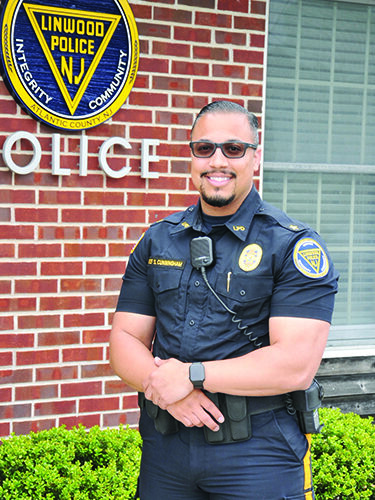Cunningham achieves certification, now actively seeking certification of entire police department
LINWOOD — Police Chief Steven Cunningham recently received certification from the New Jersey State Association of Chiefs of Police through its Accredited Chief/Command Executive Certification Program.
Cunningham, who took over as chief effective Jan. 1, said earning accreditation involves advanced leadership training.
“To achieve this level of professionalism and standards shows that I’m committed to my position and to the community,” Cunningham said, adding it allows him “to be a role model in that sense not just for officers in the police department for the community.”
Asked about the challenges of overseeing law enforcement in Linwood, Cunningham said there are no challenges, just problems to solve.
“The job is dynamic, progressive … but not challenging,” he said, noting it requires moving with the times. “It really, truly is what you make of it. You can look at it as a challenge or make it the best it can be. We work hard to ensure the community is safe but if a challenge does arise, I’m more than able to deal with it.”
Cunningham said he sees his role as part of the larger picture involving the city, schools and organizations forming intergovernmental relationships.
“We are all the same team,” he said. “These residents are important to me and to the officers in the department.”
He said he hopes to continue to build relations and be more involved in the community.
The designation lasts three years, at the end of which time certificate holders must show they have maintained the training and leadership standards since their initial award of certification. Cunningham recently underwent peer reviews and earned ACE-COP designation.
The 38-year-old started his law enforcement career as a class II special police officer with the North Wildwood Police Department in 2004 after graduating from Middle Township High School. In 2006, the Linwood Police Department hired him as a patrol officer. He was assigned as a detective in 2014.
The following year, Cunningham was promoted to sergeant and was assigned to the patrol division. In January 2016, he was reassigned to the detective bureau as detective sergeant and was designated the school liaison officer to the Mainland Regional High School and Linwood school districts.
In 2020, Cunningham was promoted to lieutenant and serves as the patrol and investigations commander.
In 2021, he was assigned to administration, overseeing professional standards and accountability and serving as the public information officer.
“I genuinely care about people and want to help, and I couldn’t find a better way to contribute than as a police officer,” Cunningham said, noting he has wanted to do so since he was 10 years old.
Cunningham earned an associate degree from the University of Phoenix in criminal justice. He is a graduate of the West Point Command and Leadership Academy through the New Jersey State Association of Chiefs of Police. He also completed training through Cambridge University in evidence-based policing and through the FBI Law Enforcement Executive Development Program.
Cunningham is a recent graduate of the New Chiefs Orientation Program and the Police Executive Institute, both through the NJSACOP. He also is a member of the Atlantic County hostage/crisis negotiation team.
Cunningham is an active member of the NJSACOP and the Atlantic County Association of Chiefs of Police.
The certification program encourages law enforcement executives to attain sanctioned benchmarks in pursuit of a recommended standard for police leadership that are measurable and attainable. By offering proof of these standards to NJSACOP assessors, individual police leaders can attain certification status.
The certification program measures essential proofs in three areas for the ACE and ACE-COP designations and in five areas for the ACE-COP Advanced Certification. If it is merited, NJSACOP awards individual leadership accredited status based on those appraisals. The program also promotes and encourages continued education through re-certification.
Cunningham said his goals include furthering his own education and achieving higher certification individually but also to have the entire department earn accreditation, making it eligible for insurance rate discounts.
“Every day you learn something, continue to humble yourself, continue to work at your craft to be the best you can possibly be — that impacts everyone around you,” he said. “You model the behavior, training and education, and then apply that to how we police.”
According to the NJSACOP, agency accreditation is a progressive and time-proven method of assisting law enforcement agencies to calculate and improve their overall performance.
It involves the adoption of standards with clear professional objectives. Agencies conduct a self-analysis to determine how operations can be adapted to meet the standards and objectives.
When the procedures are in place, a team of trained, independent assessors verifies that the applicable standards have been successfully implemented.
“The purpose is attaining highest level of professionalism, best practices and industry standards,” Cunningham said. “That’s the commitment that we are going to be making to our community.”
Calling the process a massive undertaking, he said it could take longer than two years to meet all of the standards and provide proper documentation.
“Just as I hold myself to high standards, so do members of this department,” Cunningham said. “That’s what the community deserves from its police department.”
By CRAIG D. SCHENCK/Sentinel staff


